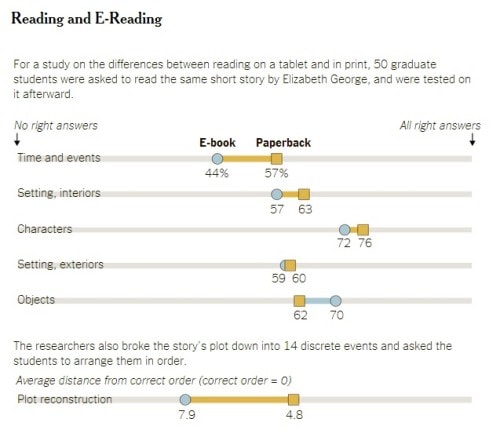Studies Disagree on Whether Readers Absorb Less on Kindles than on Paper

![292100160_743d18dd65_n[1]](https://the-digital-reader.com/wp-content/uploads/2014/08/292100160_743d18dd65_n1-250x187.jpg)
While Nicholas Carr might want to use this paper to sound the death knell of ebooks, I think further study is warranted.
From the article:
The study, presented in Italy at a conference last month and set to be published as a paper, gave 50 readers the same short story by Elizabeth George to read. Half read the 28-page story on a Kindle, and half in a paperback, with readers then tested on aspects of the story including objects, characters and settings.
…
But instead, the performance was largely similar, except when it came to the timing of events in the story. "The Kindle readers performed significantly worse on the plot reconstruction measure, ie, when they were asked to place 14 events in the correct order."
The researchers suggest that "the haptic and tactile feedback of a Kindle does not provide the same support for mental reconstruction of a story as a print pocket book does".
The Guardian only briefly mentions the rest of the study, where the Kindle group tested about the same as the control group.
Luckily for us, The NY Times covered this story on Sunday and they crafted a handy little graphic to show us how the test scores differed (click to enlarge):
As you can see, in most categories there wasn’t a huge difference between the two test groups. The one exception is time and events, which is quite similar to plot reconstruction.
So does this mean that there are limits to reading comprehension on ereaders and tablets? Maybe, but maybe not.
For one thing, this study included only two experienced Kindle users, and as you can imagine that might skew the results.
![8424416853_1a1882c786_b[1]](https://the-digital-reader.com/wp-content/uploads/2014/08/8424416853_1a1882c786_b1-500x280.jpg)
But there are other studies which could shed some light on the issue. The paper referenced by The Guardian does mention a related study, but I don’t think it’s relevant. Tell me if you can see the structural problem with the study:
Mangen also pointed to a paper published last year, which gave 72 Norwegian 10th-graders texts to read in print, or in PDF on a computer screen, followed by comprehension tests. She and her fellow researchers found that "students who read texts in print scored significantly better on the reading comprehension test than students who read the texts digitally".
Luckily that’s not the only study on the topic.
I’ve been following this question for a few years now, and while it is clear that enhanced ebooks don’t enhance education that is certainly no reason to throw out the baby with the bath water.
I also know of a 2012 paper which showed that test subjects who read on a Nook scored slightly higher on reading comprehension tests. Like the latest study that older research was based on a small group of test subjects, so it’s not possibly to use one to refute the other, but it does suggest that further study is warranted.
All in all, I would say that it is too early to draw a conclusion either way.
image by francisco_osorio, David Boyle in DC

Comments
Timothy Wilhoit August 20, 2014 um 11:19 am
"The Elizabeth George study included only two experienced Kindle users, and she is keen to replicate it using a greater proportion of Kindle regulars. But she warned against assuming that the "digital natives" of today would perform better."
Readers unaccustomed to a digital ereader not performing as well on a test? It’s just amazing that a reader who is paying greater attention to how to turn the next page instead of focusing on the story would perform worse on a reading comprehension test, isn’t it? This study has no value.
Nate Hoffelder August 20, 2014 um 11:57 am
Yes. I noticed that, but forgot to include it. Hmm, I wonder if that will bias the results?
Timothy Wilhoit August 20, 2014 um 12:45 pm
I may not be typical, but I wasn’t entirely comfortable with an eink reader when I got my first one (a K2) years ago. It took a little while before the device "disappeared." If the eink novices taking the test felt the same discomfort, their reading retention would definitely suffer. I would be more interested in knowing how those two "experienced" eink users scored. (The reason I use quotes around "experienced" is that the conductors of the test may define an experienced user as one who has used a Kindle one time. Who knows?)
I strongly believe that if an honest test is conducted, there will be little or no statistical difference between efficacy of paper or digital. IMHO.
Paul Wirtz August 20, 2014 um 12:44 pm
Did the Kindle users ever use a kindle before? There is a difference between using a reading device (book) with multi-year practice and a never used before device (Kindle).
Page turns on a ereader become with use become just as unnoticeable as they are in a book but it does take some time.
Loyd August 20, 2014 um 1:30 pm
I suspect the principle flaw in the study is that they restricted it to Kindles. As the DR article above suggests, people using a nook got a different result; use a Kobo Aura HD with the pages configured to to same standard as the pages of the paper book, with adequate margins, line spacing, the reader’s preferred font and preferred font size, etc., and you would start to find out something about using eInk readers. This study as presented does nothing more than criticize the limitations of Amazon’s flagship offering.
New Study Suggests Readers Recall More from Print than Digital News – if You Can Trust the Data – The Digital Reader September 15, 2014 um 9:57 pm
[…] since the latest digital v print study made the rounds a few weeks ago, I’ve been talking about these types of studies with a pair of specialists who have been […]
Reading Comprehension and Digital Books: Jury Still Out – Becton Literary October 14, 2014 um 7:13 pm
[…] For further breakdown, check out The Digital Reader’s take on it. […]
BillR January 5, 2015 um 4:33 am
I wonder if a site named digital reader might be biased? Hmm? Ya think?
Yet more lies from paper book fetishists | J. Nelson Leith August 27, 2015 um 9:54 am
[…] these claims have been debunked by better writers than me. Check that out, if you like, while I move on […]